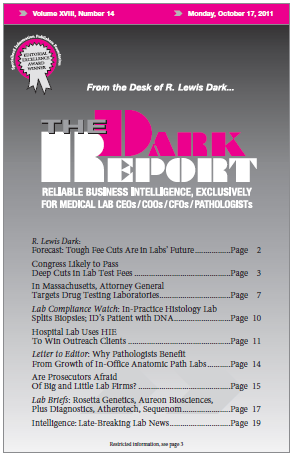ROSETTA GENOMICS TO LAY OFF 35 EMPLOYEES TO CUT EXPENSES AND SHIFT MORE FUNDING toward sales of its proprietary molecular tests, Rosetta Genomics says it will eliminate 35 jobs. The company, based in Israel, operates a clinical laboratory in Philadelphia, Pennsylvania. The Philadelphia laboratory employs eight people, but Rosetta did not disclose whether staff layoffs …
Rosetta Genetics, Aureon Biosciences, Plus Diagnostics, Atherotech, Sequenom Read More »
To access this post, you must purchase The Dark Report.


